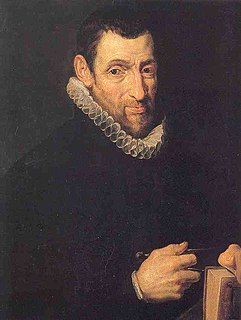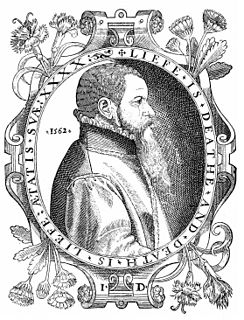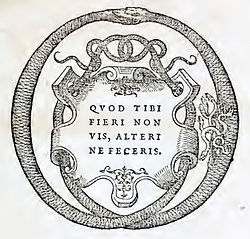
Robert I Estienne, known as Robertus Stephanus in Latin and also referred to as Robert Stephens by 18th and 19th-century English writers, was a 16th-century printer and classical scholar in Paris. He was a former Catholic who became a Protestant late in his life and the first to print the Bible divided into standard numbered verses.

Henri Estienne, also known as Henricus Stephanus, was a 16th-century French printer and classical scholar. He was the eldest son of Robert Estienne.

Étienne Dolet was a French scholar, translator and printer. Dolet was a controversial figure throughout his lifetime. His early attacks upon the Inquisition, the city council and other authorities in Toulouse, together with his later publications in Lyon treating of theological subjects, roused the French Inquisition to monitor his activities closely. After being imprisoned several times, he was eventually convicted of heresy, strangled and burned with his books due to the combined efforts of the parlement of Paris, the Inquisition, and the theological faculty of the Sorbonne.
This article presents lists of the literary events and publications in 1539.
ReginaldWolfe was a Dutch-born English Protestant printer and one of the original members of the Royal Stationers' Company.

Charles Estienne, known as Carolus Stephanus in Latin and Charles Stephens in English, was an early exponent of the science of anatomy in France. Charles was a younger brother of Robert Estienne I, the famous printer, and son to Henri, who Latinized the family name as Stephanus. He married Geneviève de Berly.

Christophe Plantin was an influential French Renaissance humanist and book printer and publisher living and working in Antwerp.

John Day was an English Protestant printer. He specialised in printing and distributing Protestant literature and pamphlets, and produced many small-format religious books, such as ABCs, sermons, and translations of psalms. He found fame, however, as the publisher of John Foxe's Actes and Monuments, also known as the Book of Martyrs, the largest and most technologically accomplished book printed in sixteenth-century England.

Elzevir is the name of a celebrated family of Dutch booksellers, publishers, and printers of the 17th and early 18th centuries. The duodecimo series of "Elzevirs" became very famous and very desirable among bibliophiles, who sought to obtain the tallest and freshest copies of these tiny books.

Richard Field (1561–1624) was a printer and publisher in Elizabethan London, best known for his close association with the poems of William Shakespeare, with whom he grew up in Stratford-upon-Avon.

Paulus Manutius was a Venetian printer with a humanist education, the third son of the famous printer Aldus Manutius and his wife Maria Torresano.
Nicholas Okes was an English printer in London of the Jacobean and Caroline eras, remembered for printing works of English Renaissance drama. He was responsible for early editions of works by many of the playwrights of the period, including William Shakespeare, Ben Jonson, John Webster, Thomas Middleton, Thomas Dekker, Thomas Heywood, James Shirley, and John Ford.

Charlotte Guillard was the first woman printer of importance. Guillard worked at the famous Soleil d'Or printing house from 1502 until her death. Annie Parent described her as a "notability of the Rue Saint-Jacques", the street where the shop was located in Paris, France. She became one of the most important printers of the Latin Quarter area in the city of Paris. As a woman, she was officially active with her own imprint during her two widowhood periods, that is to say in 1519–20, and in 1537–57. While she was not the first woman printer, succeeding both Anna Rugerin of Augsburg (1484) and Anna Fabri of Stockholm (1496), she was the first woman printer with a significantly known career.
Nationality words link to articles with information on the nation's poetry or literature.
Jean Crespin was a French Protestant lawyer who became a significant printer and martyrologist in Geneva.

Antoine de Créqui Canaples (1531–1574) was a French Roman Catholic bishop and cardinal.
Jean de Tournes may refer to:

Jean de Tournes (1593–1669) was a Swiss printer, book publisher and bookseller, and member of a long-lasting family printing business. He was the son of Jean de Tournes (1539–1615) and grandson of Jean de Tournes (1504–1564); he was the son-in-law of Samuel Crespin.
















